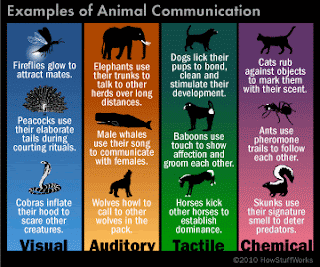Animal Communication
Animal communication is when animals use signals, such as sounds, smells, or sights, to share information that
influences how other animals act. This is important for things like finding partners, protecting their area, and working together in groups. Animal communication is how animals share information with each other, which can change how the other animal acts.Types of signals
- Visual: Body movements, colors, and displays.
- Auditory: Sounds like voices, clicks, or whistles.
- Chemical: Scents that can cause certain actions.
- Tactile: Touch, like hugging or cleaning each other, which helps them bond.
Functions of animal communication
⚫Finding mates: Displays and scents attract partners.
⚫Establishing dominance: Aggressive actions show who is in charge.
⚫Defending territory: Sounds and scents warn off others.
⚫Coordinating group behaviour: Signals help animals work together, like hunting or migrating.
⚫Caring for young: Touch and sounds help parents and their young interact.
Examples
- Honeybees: The "waggle dance" shows where to find food.
- Dogs: Barking, wagging tails, and body language express feelings and intentions.
- Elephants: Low sounds can travel far to help the group move together.
- Tarsiers: Use different calls for marking territory, mating, and warnings.
- Mole-rats: Use "head drumming" to announce themselves and defend their area.
Difference from human language
Animals can share information, but their way of communicating is simpler and less flexible than human language. They cannot create new combinations of symbols.







🥰💕
ReplyDeleteExcellent 😍✨️❤️
ReplyDelete❤️😍
ReplyDelete